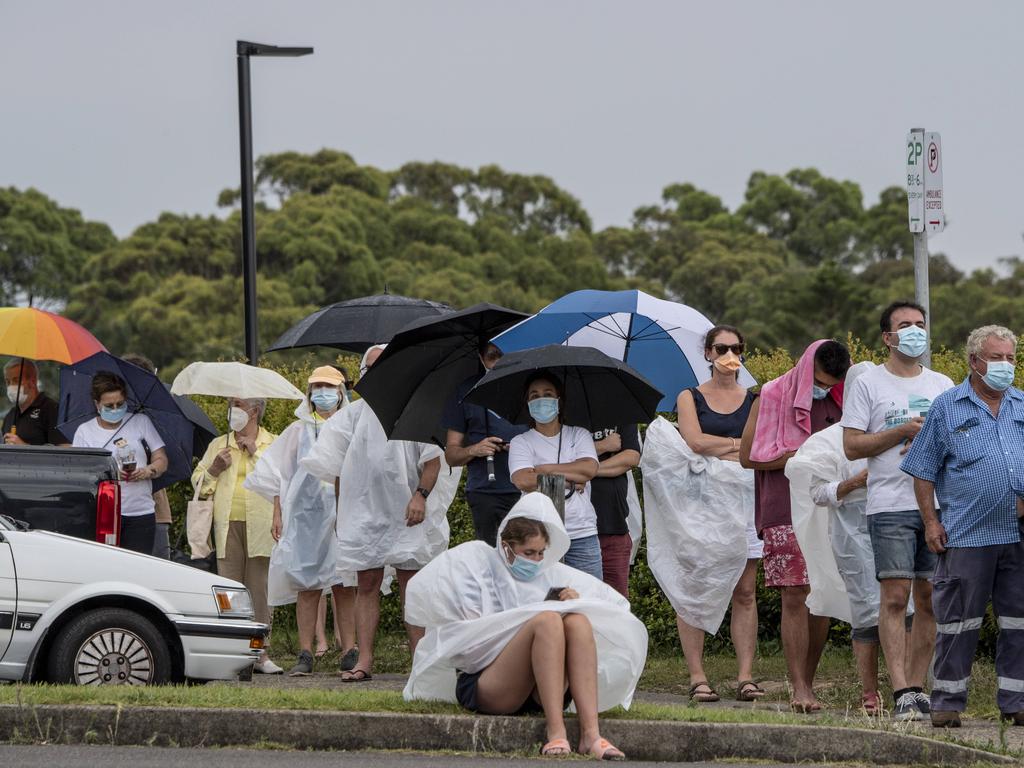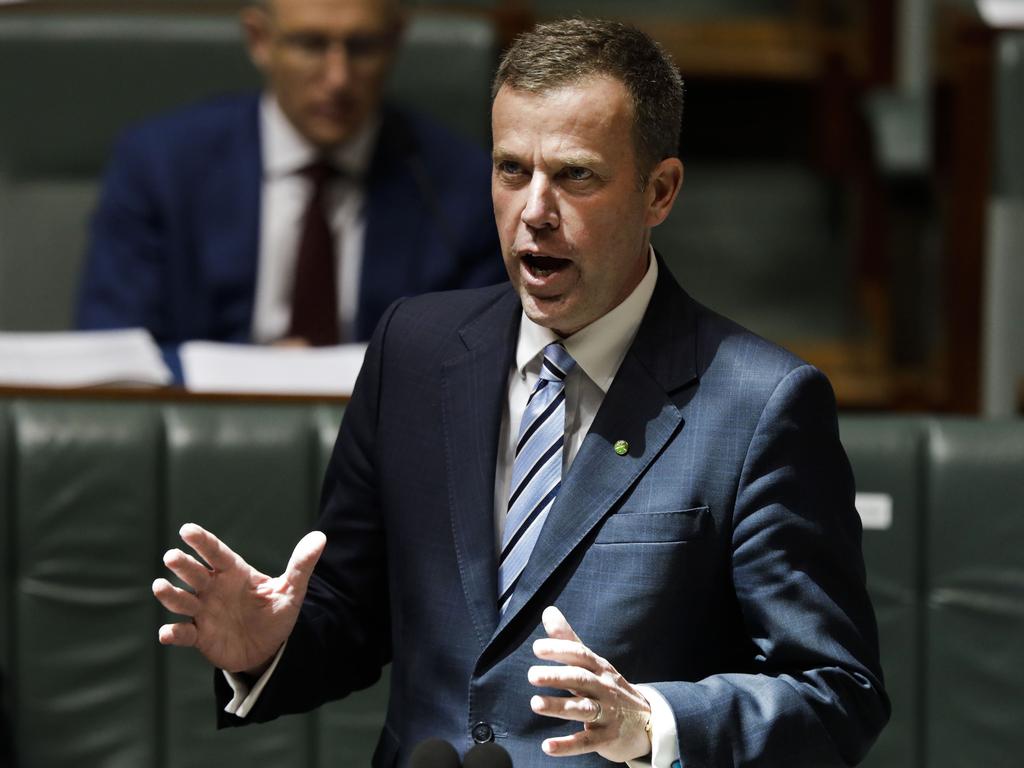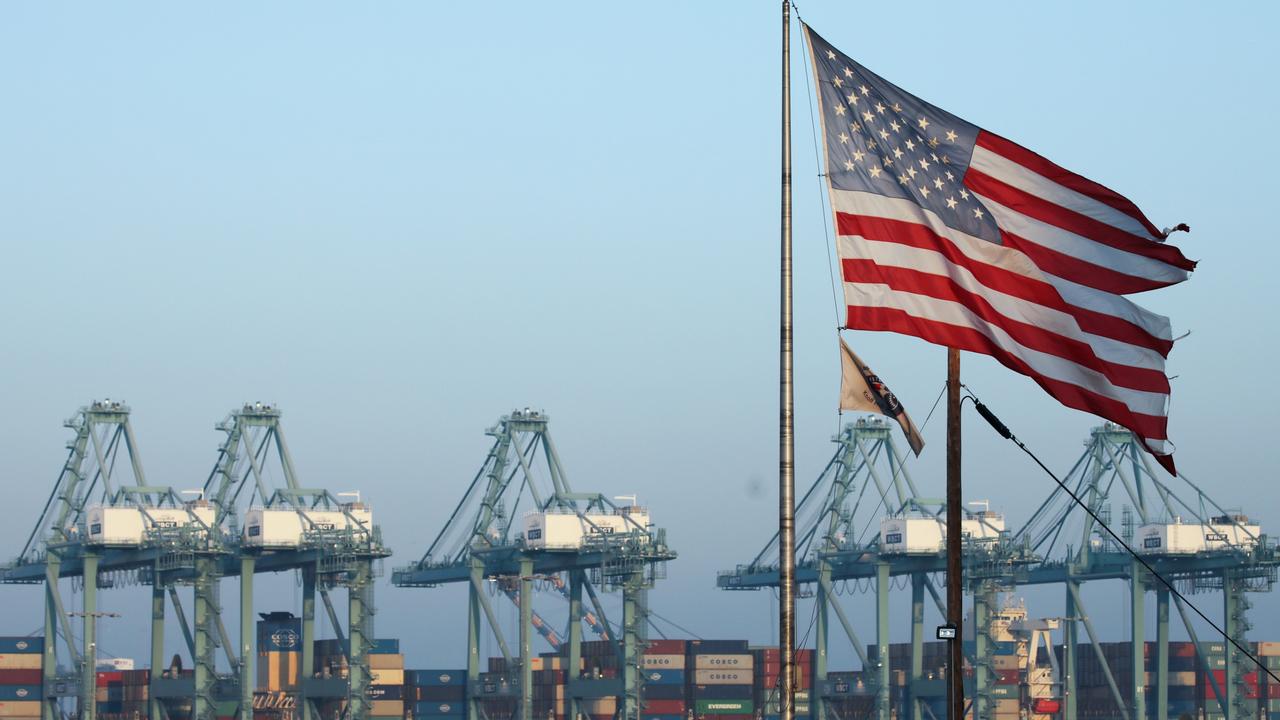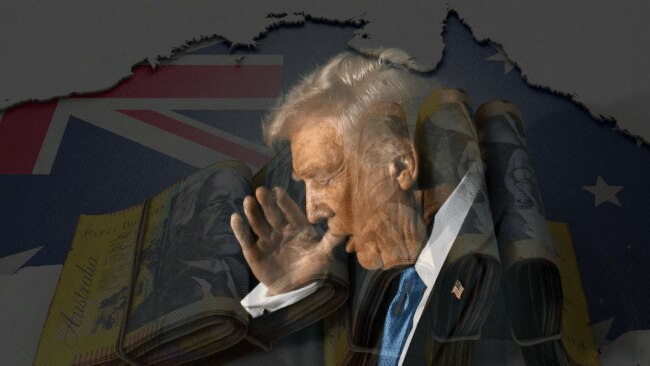Covid outbreak in Sydney spooks investors
In its biggest one-day fall this month, the benchmark S&P/ASX 200 tumbled to a two-day low, shedding $25bn in value.
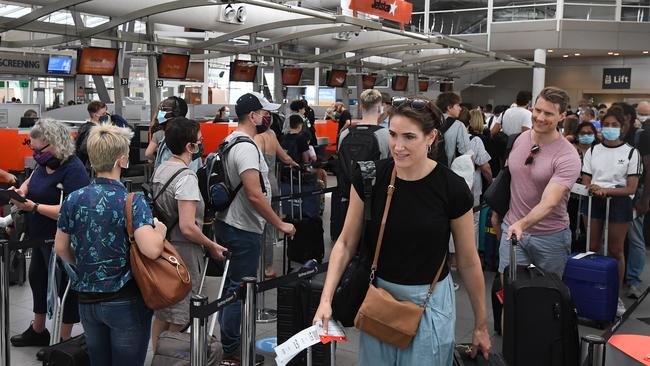
The stockmarket was rocked by Sydney’s worsening COVID-19 outbreak as shares in travel-related companies were hit hard amid fears of renewed border closures heading into the holiday season.
In its biggest one-day fall this month, the benchmark S&P/ASX 200 index tumbled 81.1 points, or 1.2 per cent, to a two-day low of 6675.5, shedding $25bn in value.
It came as states including Queensland, Victoria and Western Australia imposed varying degrees of travel restrictions on NSW residents in response to the coronavirus outbreak in Sydney’s northern beaches which ended two weeks during which the state was effectively COVID free.
National carrier Qantas dived 3.5 per cent, Sydney Airport lost 2.9 per cent and Flight Centre fell 2.7 per cent.
Ampol fell 4.7 per cent and Viva Energy lost 4 amid concern about the impact on fuel demand.
Corporate Travel Management CEO Jamie Pherous said state borders should remain open because closing them did little for business confidence.
Noosa-based Mr Pherous said he had confidence in the NSW and Queensland governments to manage the outbreak and not hurt business confidence.
“In Noosa, everyone is on alert and following best practice, the governments should leave everything open and manage it because closing does not do much for business confidence.
“They don’t want to compromise the strong economic data which is highly correlated to business confidence. If they start opening and closing borders it will ruin that. We are seeing a much stronger recovery than we thought, business makes the world go around.”
Mr Pherous said the COVID outbreak must be kept in perspective and state governments should have the resources to manage it.
Australia’s most powerful hotelier, Simon McGrath, the head of Accor, which controls more than 400 hotels, argued that short and sharp border closures and quick re-openings were the way to contain COVID.
“The more we undertake such measures the better we will become at managing it,” he said.
Mr McGrath said Australia was enjoying a high level of business confidence at the moment. “Overall a short shutdown is an investment in mid to longer term confidence. It’s better than having the place closed like Europe.”
Andrew Burnes, chief executive of the listed travel agency Helloworld, said NSW had done a great job in managing COVID over the last eight months and he was confident that the state would be able to bring the outbreak under control.
“(But) this is a stark reminder of the fragility of the outcomes that Australia as a nation has been able to achieve,” Mr Burnes said.
“Where we are at the moment is like a ceasefire in what has been a deadly war and it demonstrates again the extraordinary transmissibility of this virus.
“We have to remain as vigilant today as we have been over the last nine months.”
In Sydney, Goldman Travel joint managing director David Goldman, a specialist in corporate and leisure travel, said several of his clients had delayed trips to Victoria and Queensland as a result of the outbreak.
“At the moment it is business as usual (although) we are contacting our clients based in Sydney’s northern suburbs. We have had a few people delaying their holiday and corporate trips.
“Our industry has become so malleable, this is the new normal now,” Mr Goldman said.
Banks and property trusts were caught up in the sell-off with National Australia Bank down 2 per cent and Stockland down 4.3 per cent.
Profit warnings also weighed on the bourse with QBE Insurance shares down almost 13 per cent after the company flagged an adjusted net cash loss of $780m for its fiscal 2020 year.
a2 Milk slumped 24 per cent after revealing that its fiscal 2021 revenue would be about 20 per cent less than previously advised.
“As a result of the COVID-19 pandemic, this has been a year in which people have lost loved ones, suffered ill-health and been separated from family,” said NAB chairman Phil Chronican.
“It is a year that saw businesses up-ended and economies shattered. In the last 24 hours, we have seen in Sydney how quickly the situation can change.”
Biotech stock Mesoblast dropped 36 per cent after a trial of its remestemcel-L drug for COVID patients with moderate-to-severe acute respiratory distress syndrome failed to achieve its primary goal.
The Australian dollar fell as much as 0.5 per cent to US75.88c after hitting a 30-month high of US76.40c on Thursday.
Iron ore miners bucked the sell-off with Fortescue Metals up 2.2 per cent after the spot price of iron ore rose 1.1 per cent to $US158.70 a tonne, near its highest in 7½ years.
The ASX 200 reached a 10-month high of 6756.7 on Thursday as optimism about COVID vaccines and expectations of imminent US fiscal stimulus buoyed global commodities and equities markets, despite the prospect of broader restrictions and COVID cases and deaths hitting new record highs in the US.
Equity strategists remain hopeful of another good year in 2021, with UBS predicting a 14 per cent rise in the ASX 200 to 7600 points next year, Macquarie saying the index could rise at least 10 per cent and AMP Capital and CommSec strategists predicting the index will hit record highs.
UBS strategist Pieter Stoltz is tipping 15 per cent growth in earnings per share for the overall market and a price-to-earnings ratio valuation edging down to 19 times.
“Valuations across the Australian market are at near record highs, with the ASX200 trading at a 19.5 times PE ratio, while the valuation of the industrials ex-financials is at a record high 30.6 times,” Mr Stoltz noted.
“However, we argue that a combination of low real rates and a likely rebound in earnings and dividends means equity markets can continue to move higher.”
Australia’s higher weighting to cyclical sectors also meant it was well placed to play “catch up” through 2021 and outperform global equities after underperforming 12 per cent since COVID struck.
While a COVID resurgence could increase volatility, a delay in the rollout of vaccines or rising bond yields would represent “downside risks”.
But there were upside risks around the possibility of greater policy stimulus and resources sector upgrades given surging iron ore prices.
In his base case for the Australian economy next year, Mr Stoltz saw a vaccine rollout starting in the first half of the year, supporting a recovering labour market, alongside a strong housing market, despite the prospect of tapering fiscal and monetary policy stimulus.
“Signposts continue to improve, leading us to be more positive on a 2021 economic recovery,” he said. He favoured cyclicals over defensives, value over growth, and small-caps over large companies.
“These trades are likely to peak during the vaccine rollout toward the end of 2021.”
Macquarie’s Australian equity strategist, Matthew Brooks, expected the ASX 200 to rise more than 10 per cent, supported by an improving economic cycle driving an earnings recovery.
Including dividends, the total return of the index including dividends could be as much as 20 per cent as the Australian Prudential Regulatory Authority effectively gave banks its blessing to boost dividends next year, and iron ore miners will have “super” profits to return to shareholders.
“We are positive on the outlook for stocks, especially while the expansion phase continues,” Mr Brooks said.
With the support of a vaccine and stimulus, he favoured reflation trades including cyclicals, value and commodities, as well as “COVID losers”.
He also expected rising bond yields, which would improve the outlook for the financials sector.
“Just as 2020 was dominated by the pandemic and this determined the relative performance of investment markets and stocks, 2021 is likely to be dominated by the recovery,” said Shane Oliver, AMP’s Capital’s chief economist.
Australian shares were “likely to be relative outperformers”.
“The dividends will start to go up again as we go through 2021, as banks and others say ‘well, things haven’t been as bad as we thought’.”

